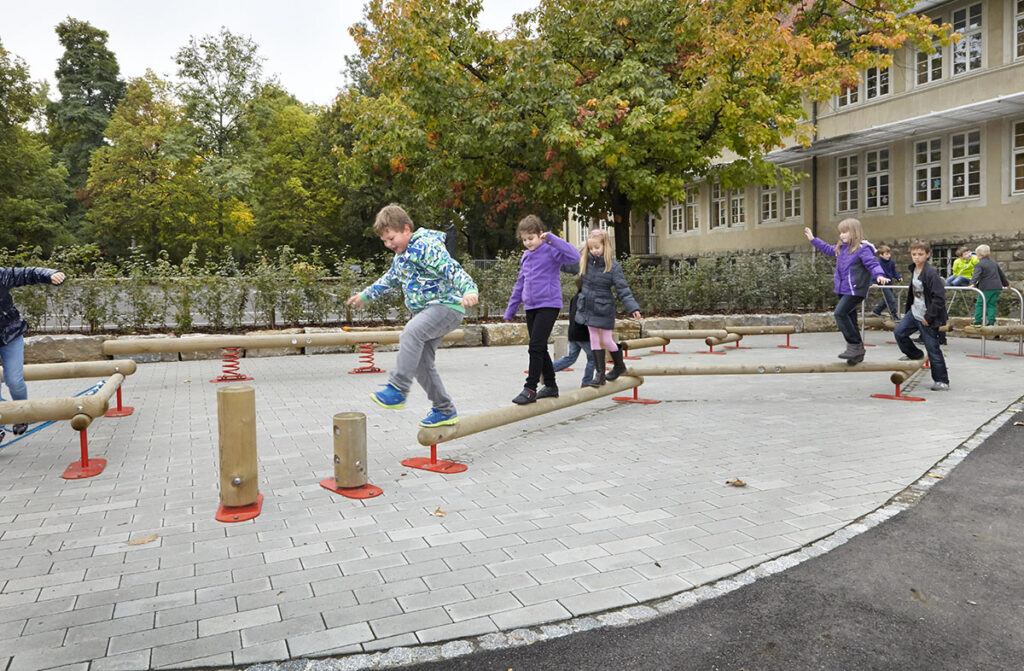Children learn through play. This also applies to the development of motor skills. Functioning gross motor skills are particularly important for further developmental steps of the child because they are closely linked to other areas of development and learning. Well-developed gross motor skills have an impact on the development of fine motor skills, coordination skills, responsiveness and the child’s physical health. Especially in the first year of life, motor skills should be trained, as the child’s development progresses rapidly during this time. In the following blog post, you will learn which movements fall under gross motor skills and how you can promote gross motor skills.
Table of contents
- Gross motor skills vs fine motor skills
- Why are gross motor skills so important?
- Encouraging gross motor skills: Tips & play ideas
Gross motor skills vs fine motor skills
The term motor function refers to the totality of all movement processes controlled by the brain. It is divided into the areas of gross motor skills and fine motor skills.
What are gross motor skills?
The term gross motor skills cover the overall movements of the human body. This involves movements and motor processes of larger muscle groups, such as those of the limbs or the trunk. Adults can promote gross motor skills in children by providing them with enough space to play and romp around. This is because the development of gross motor skills usually takes place unconsciously. Gross motor skills include movements such as:
- Running
- Crawling
- Climbing
- Jumping
- Balancing
- Seesawing
- Swimming
- Riding a bicycle or tricycle
What are fine motor skills?
Children can only develop fine motor skills if their gross motor skills are developed in accordance with their age. By the way, this also includes all smaller and finer movements of the body. For example, hand, finger, foot, toe, eye, face or mouth motor skills. As soon as the gross motor skills are primarily developed, the learning of fine motor skills begins. These include, for example, writing, painting, kneading or tying shoelaces.
Why are gross motor skills so important?
The development of gross motor skills has fundamental effects on other areas of the child’s development. Skills such as crawling, walking and so on are part of age-appropriate development. Sufficient movement is therefore already important in infancy. Otherwise, the child may become overweight or suffer from postural defects. Motor development also has an influence on:
- Agility
- Balance
- Reactivity
- Endurance and stamina
- Coordination skills
- Bounce and speed
- Fine motor skills

Promoting gross motor skills: Tips & play ideas
Children usually train their gross motor skills all by themselves. And they like to do it in nature. But especially in the age of smartphones, tablets and the like, sufficient exercise tends to fall by the wayside. Adults should, therefore, regularly offer their children incentives to move. The following game ideas can help:
Balancing
Balancing exercises can be wonderfully integrated into everyday life. Whether on a low wall, paving stones, or on the pavement – Balancing is always possible! Adults can promote gross motor skills by showing children how to balance. The little ones will certainly enjoy doing it afterwards.
Playing catch
Playing catch is simple, but it has a great effect on the development of gross motor skills. The little ones train their strength, reactions and endurance during the romp.
Ball games
Games such as throwing and catching a ball can specifically promote gross motor skills. However, to bring some variety into the learning unit, ball games can also be wonderfully modified. For example, you can practise aiming at an empty bucket or shooting at the goal with the little ones.
Children’s wheel/ walker
Certain toys can also promote gross motor skills. Children’s exercise bikes, for example, encourage the little ones to move more. They also train their sense of balance and coordination.
Playground
Children can easily train their motor skills on the playground because just running around on the playground builds up their strength and stamina. Sliding and swinging, on the other hand, develop their sense of balance and coordination. Climbing walls, poles & co. also provide an extensive training programme for gross motor skills.
On the eibe blog, you can also read how the playground promotes learning or how you can encourage children to move more.

